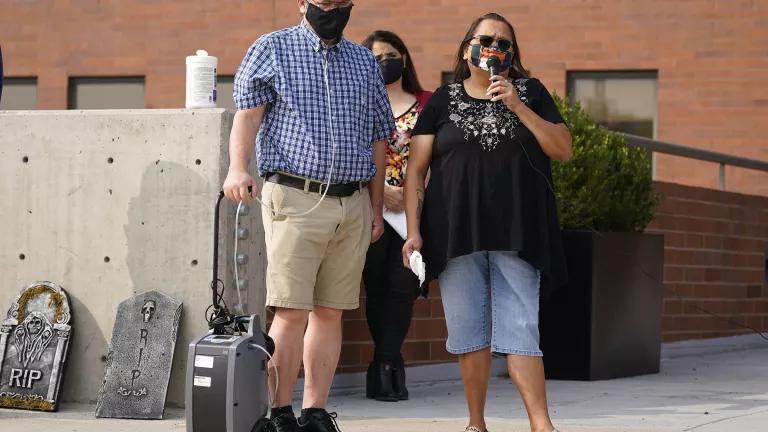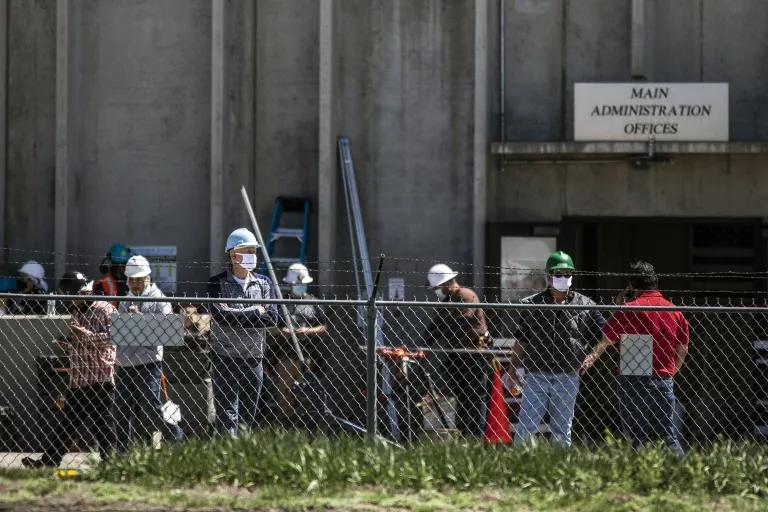COVID-19 Has Exposed the Gross Exploitation of Meatpacking Workers
The ongoing health and safety failures at the JBS meat-processing plant in Greeley, Colorado, highlight an industry-wide truth: It’s production over people, even in a deadly pandemic.

Alfredo Hernandez got sick on March 18. It started with fever, nausea, and the kind of fatigue that makes you feel like you’ve been hit by a truck. Over the following week, his symptoms worsened, and at the advice of his doctor and the encouragement of his wife, Rosario, he went to the emergency room. Hernandez ended up spending nine days in the hospital, where at one point his fever got so high that doctors had to cover his body in ice packs to bring the temperature down. Nobody was surprised when, on April 1, his COVID-19 test came back positive.
The 55-year-old almost certainly had contracted the virus at the JBS meatpacking plant in Greeley, Colorado, where he’s worked as a custodian for 31 years. In addition to the highly trafficked cafeteria, Hernandez cleaned areas like the men’s restrooms and locker rooms at the start of a COVID-19 outbreak that ended up sickening more than 300 people and killing six plant workers. (A seventh JBS employee, who worked in Greeley’s corporate office, also died.)
Seven months later, Hernandez has not yet recovered and still relies on supplemental oxygen. “He gets so frustrated because he just wants to go back to work,” Rosario says. “But he also gets really exhausted and just wants to sleep. And he gets depressed because there’s nothing he can do because he gets so out of breath. He tries to take off the oxygen and his chest tightens.”
Despite Hernandez’s decades-long loyalty to the company, JBS, the largest beef and pork processor in the world, has challenged him throughout his ordeal, withholding more than a month’s pay (until he took action) and denying any responsibility for his or his coworkers’ sicknesses. Lately the family has been surviving on Hernandez’s $750 a month in long-term disability payments, with no clear idea of when—or if—he’ll be able to return to work. With the local union’s help, they’ve decided to take JBS to court to get the company to agree to a workman’s compensation claim. “Hopefully, it’ll come through,” Rosario says, “because the bills are really piling up.”
Kim Cordova, president of the United Food and Commercial Workers (UFCW) Local 7, the union that represents the Greeley plant workers, believes JBS’s response to the pandemic was woefully late and inadequate—and undeniably negligent. According to Cordova, the plant didn’t provide any information about COVID-19 risks or share any company safety protocols for its roughly 3,000 union-member employees, who speak at least 30 different languages.
JBS also failed to promptly provide masks or any other personal protective equipment to the workers, aside from the gloves and aprons they usually wear for their jobs, which is one of the most dangerous in the world even under normal circumstances. Rosario remembers her husband mentioning that JBS put a few bottles of hand sanitizer out and notes that this was the extent of the company’s initial response to the coronavirus at the Greeley plant.
“Not only were they not advising the workers of the risk of COVID exposure at their facility, but they also didn’t follow the CDC guidelines when COVID first hit,” Cordova says of the Greeley plant managers. “They were really trying to keep the workers in the dark—they wanted workers to continue to work and work and work without advising them of the risk of potential exposure in that facility. It was all about forcing these workers to keep their heads down, their eyes closed, and to continue to work in a really dangerous situation.”
On April 7, the plant saw its first employee death due to COVID—that of Saul Longoria Sanchez, a 78-year-old 30-year veteran of the plant who never missed a day of work—as other workers inundated the area’s health-care system. Thousands, forced to take unpaid days off, called in sick. Despite hundreds of positive tests and calls from the union and others to close the plant as early as April 10, JBS waited until the 15th to close its doors. By April 24 it was back up and running, with some new safety measures—like extra signage and dividers in break rooms and on the fabrication floor—but, critically, without widespread employee testing. “They didn’t want the world to know how sick that plant was,” Cordova says. “All of them lied to the public and to the workers who were scared to go back to work.”
She continues: “Our elected officials did everything to force workers to go back to work without ensuring that there were going to be enforceable and verifiable safety rules put in place—with oversight. These workers have been treated as disposable and sacrificial humans. It’s absolutely unconscionable.”
Four days after JBS reopened—and as COVID-19 was sweeping through other meatpacking plants like Tyson Foods in Waterloo, Iowa, and Smithfield Foods in Sioux Falls, South Dakota—President Trump issued an executive order aimed at keeping meat production going, stoking fears of a meat shortage.

“We were hearing straight from the top that maintaining our meat supply, much of which goes to export, was more important than the lives of workers on the line,” says Valerie Baron, a senior attorney at NRDC. “And that really had a big impact. It also had a chilling effect on states that otherwise might have taken more protective measures for their workers.” What’s more, a recent ProPublica investigation found that it was the meat industry itself, concerned with its profits, that had drafted the executive order to keep plants open.
“It’s not a coincidence that this industry is taking advantage of historically marginalized groups and taking advantage of racist structures of political and other power,” Baron adds. “We’ve seen this industry be very willing to treat these workers as disposable. And you can’t ignore the race component of that.”
Indeed, the vast majority of meatpacking workers are people of color, overwhelmingly Latino, and many are immigrants. “It hits our community big time,” says Joe Enriquez Henry, vice president and director of the nonprofit, nonpartisan advocacy and service organization Forward Latino. “Most [of the workers] are first-generation here in the States. And they have nowhere to go; they’ve got to feed their families. So they’re feeling very cornered right now. These are better than other types of jobs as a way to feed a family, but you shouldn’t have to die to do it.”
Forward Latino has called for a meat boycott to support workers and bring about some structural changes in the meat-processing industry. Most immediately, some protocols include ensuring at least six feet of distance between workers who typically stand elbow-to-elbow and face one other. The line speed needs to slow way down, Henry says, and there needs to be regular public COVID testing, with data reported to the CDC. The plants also need better ventilation.
UFCW Local 7 too is calling for safety laws and regulations that are verified and enforced by state and federal inspectors. Cordova also wants to see an end to the draconian work-while-sick culture and attendance policies at plants like JBS. “We’re doing everything we can,” she says, “but these workers’ lives really don’t mean anything to the administration we have.”
Henry agrees: “Racism has allowed politicians to keep their eyes closed, has blinded them from the terrible things that have been occurring in these plants for decades.”
Lena Brook, NRDC’s food campaigns director, notes that the COVID-19 pandemic merely exacerbates industry-wide problems that have existed for years. “While JBS is a very bad actor, it is not alone,” she says. “This is really a meat industry problem.” Four companies (JBS, Tyson, Cargill, and National Beef, known as the Big Four) control 80 percent of all beef processing in the United States, so the power is heavily concentrated. “No matter which way you look, there’s exploitation, environmental and public health threats, climate change impact, and disproportionate power in the hands of industry,” Brook says. “That’s the sort of dynamic that we’re working in, and then you layer in a pandemic and it’s a whole other level. There’s a pattern of disregard for human life. Our insatiable appetite for meat comes at a really high price.”
Cordova certainly sees this firsthand at the Greeley plant: “The faster they work and the more animals they kill, the more money JBS makes. It doesn’t matter if workers die because of it.”
Finally, after seven months of UFCW Local 7 imploring the Occupational Safety and Health Administration (OSHA) to investigate the COVID-19 outbreak response at the JBS plant in Greeley, the agency imposed a fine of $15,615 on the company on September 12. According to OSHA, $15,000 is the largest fine allowed by law. “It’s absurd, and it’s absolutely insulting. $15,000 is nothing compared to $54 billion in profit,” Cordova says, noting that OSHA’s role has been like that of a fox watching the henhouse. “That’s not going to stop an employer. In fact, it’s incentive for them to be more unsafe and to continue to put production over people.”
As Rosario points out, $15,000 doesn’t even cover the costs of one funeral. “JBS has been horrible,” she says. “My husband was afraid at first to let people know what was going on. But the only way people are going to know is if we tell the story.”
This NRDC.org story is available for online republication by news media outlets or nonprofits under these conditions: The writer(s) must be credited with a byline; you must note prominently that the story was originally published by NRDC.org and link to the original; the story cannot be edited (beyond simple things such as grammar); you can’t resell the story in any form or grant republishing rights to other outlets; you can’t republish our material wholesale or automatically—you need to select stories individually; you can’t republish the photos or graphics on our site without specific permission; you should drop us a note to let us know when you’ve used one of our stories.

If You Care About Climate Change, Then You Care About the Farm Bill
Three Ways We Can Make Schools Healthier This Year
Latina Farmworkers Speak Out about the Hazards of Life in California’s Fields